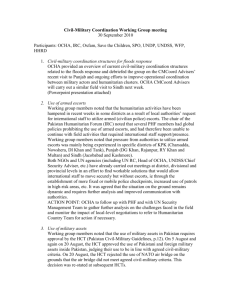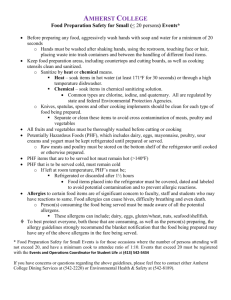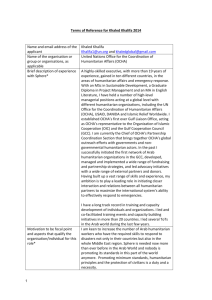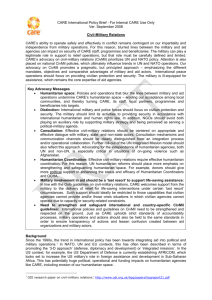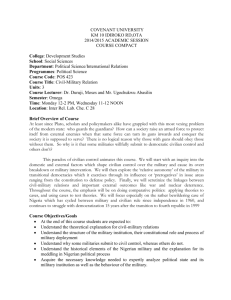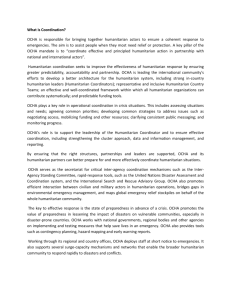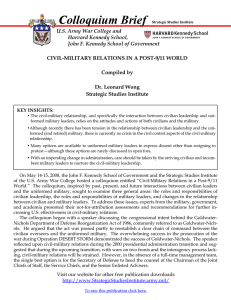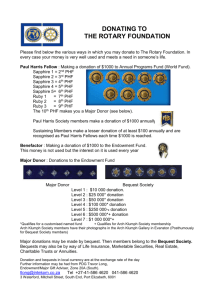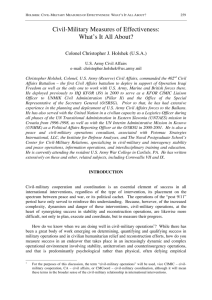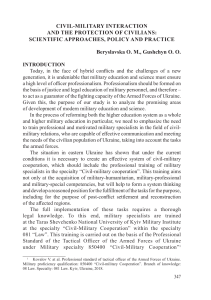Civil-Military Coordination Working Group
advertisement
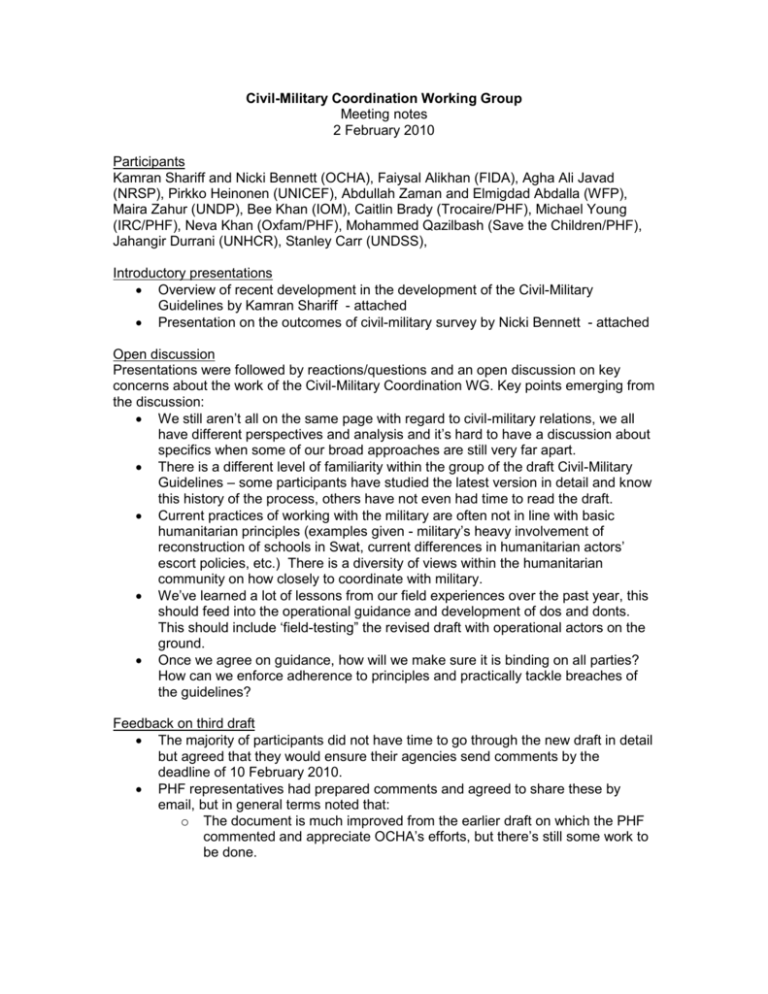
Civil-Military Coordination Working Group Meeting notes 2 February 2010 Participants Kamran Shariff and Nicki Bennett (OCHA), Faiysal Alikhan (FIDA), Agha Ali Javad (NRSP), Pirkko Heinonen (UNICEF), Abdullah Zaman and Elmigdad Abdalla (WFP), Maira Zahur (UNDP), Bee Khan (IOM), Caitlin Brady (Trocaire/PHF), Michael Young (IRC/PHF), Neva Khan (Oxfam/PHF), Mohammed Qazilbash (Save the Children/PHF), Jahangir Durrani (UNHCR), Stanley Carr (UNDSS), Introductory presentations Overview of recent development in the development of the Civil-Military Guidelines by Kamran Shariff - attached Presentation on the outcomes of civil-military survey by Nicki Bennett - attached Open discussion Presentations were followed by reactions/questions and an open discussion on key concerns about the work of the Civil-Military Coordination WG. Key points emerging from the discussion: We still aren’t all on the same page with regard to civil-military relations, we all have different perspectives and analysis and it’s hard to have a discussion about specifics when some of our broad approaches are still very far apart. There is a different level of familiarity within the group of the draft Civil-Military Guidelines – some participants have studied the latest version in detail and know this history of the process, others have not even had time to read the draft. Current practices of working with the military are often not in line with basic humanitarian principles (examples given - military’s heavy involvement of reconstruction of schools in Swat, current differences in humanitarian actors’ escort policies, etc.) There is a diversity of views within the humanitarian community on how closely to coordinate with military. We’ve learned a lot of lessons from our field experiences over the past year, this should feed into the operational guidance and development of dos and donts. This should include ‘field-testing” the revised draft with operational actors on the ground. Once we agree on guidance, how will we make sure it is binding on all parties? How can we enforce adherence to principles and practically tackle breaches of the guidelines? Feedback on third draft The majority of participants did not have time to go through the new draft in detail but agreed that they would ensure their agencies send comments by the deadline of 10 February 2010. PHF representatives had prepared comments and agreed to share these by email, but in general terms noted that: o The document is much improved from the earlier draft on which the PHF commented and appreciate OCHA’s efforts, but there’s still some work to be done. o The scope should be national, not specific to NWFP and FATA. [Other participants agreed, OCHA agreed to clarify this in case current language is not clear enough.] o Complex emergencies and natural disasters should be covered within the same document, and the document should have a long lifespan rather than requiring frequent updating. Strategy of co-existence is appropriate for all of Pakistan at present, there will be a different approach once we have reached a post-conflict phase and there may be greater scope for cooperative strategies. [OCHA noted that the current complex emergency situation prevails in some parts of NWFP and FATA and not necessarily across the country, and that it will ensure clear adherence to conceptual frameworks for civil-military coordination with respect to complex emergencies and natural disasters. The format/number of documents was seen by some as less important. Participants agreed it would be useful to have a discussion group that looks at this question, alongside other proposed discussion groups.] Participants agreed that it is crucial for all WG members to send feedback on their views and contribute to discussion group process. Some UN agencies like WFP and UNDP have not yet fed back any comments on earlier versions – important to capture their views to ensure that all humanitarian agencies are committed to the process. Action points Civil-Military Coordination WG members to share their comments on third draft of Civil-Military Guidelines by 10 February 2010. PHF to circulate its detailed comments to the WG by email. OCHA to share copies of the two powerpoints presented at the meeting. OCHA to organize small discussion groups to feed into development of guidelines and action plan, and share overview of proposed meeting schedule with WG members. Civil-Military Coordination WG members to indicate their availability and interest for participating in smaller discussion groups. Next steps The next meeting of the WG (before the end of February 2010) will aim to endorse a fourth draft of the Guidelines so that it can be submitted to the HCT for approval, and formal discussions with the military actors can commence. There needs to be a wider participation from UN agencies: UNICEF, UNHCR and WFP in particular and other humanitarian partners (less PHF) in the informal discussion groups.
